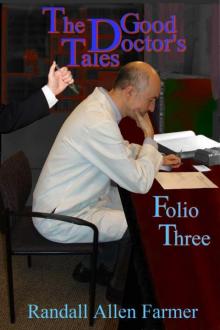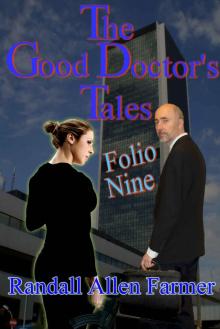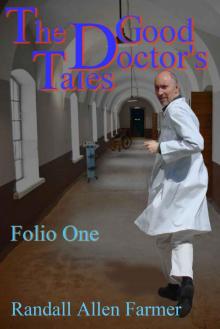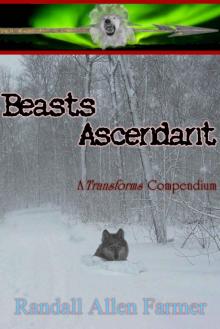- Home
- Randall Farmer
Beasts Ascendant: The Chronicles of the Cause, Parts One and Two Page 8
Beasts Ascendant: The Chronicles of the Cause, Parts One and Two Read online
Page 8
Montana Winter and Quiet Creeper’s faces paled, and Colonel Loess gasped.
“We’re doomed, then,” Colonel Leo said, after a moment. “Against Transform armies three to five times normal size, we won’t stand a chance. This also explains the need for the Arms to overthrow the first Focuses. The first Focuses would have never permitted such cooperation with the Crows. Kali, and later, the Commander, had to be taking out the first Focuses as a way to win over the Crows and do a favor potent enough to bind the Focuses to them, forever. This is bad, General.”
“Perhaps,” I said. “Perhaps not. The adoption of radical programs always causes a period of chaos, and we have fruits of our own research to counter them. Add into that the decapitation of our enemies’ leadership in the Pittsburgh incident, and with what’s going on in normal politics, I think we have a perfect opportunity to strike.”
“Normal politics?” Colonel Montana Winter said.
“Yes. The Vietnam War is over. The war hawks will be looking for a new target, and I’m afraid, in the long term, the target will be us. My face already sits on the FBI’s ten most wanted list. How long will it be before all our faces are on that list? On the other hand, the media has become fixated on a political crisis in Washington, this ‘Watergate’ thing. Despite the so-called Washington Seven pleading guilty to the break-in, the real scandal revolves around a cover-up, and the media sharks smell blood. Until this Watergate scandal plays out, the government won’t be able to turn their full attention to us. Don’t forget that the normals own the benefits of the Transform secrets sold to them by the Chrysanthemum Corporation. I fear that if we don’t win soon, we will never win, because of their secret weapons.”
“But our research programs!” Colonel Loess said. “We’ve been making such good progress.”
“We’ve mastered enough of the new techniques to matter. We’ll master the rest by testing them in battle,” I said. “My friends, we must strike now, and strike hard. This is our time. Put the research and the recruiting on the back burner and sharpen your claws, my Colonels. The Hunters are going to war!”
I roared, a Terror roar echoed by my Colonels. And Hecate.
Hecate smiled.
Chronicle II
The Apocalypse Scenario
Ecology (April 3, 1971)
Carol,
Here is the base scenario you requested, with estimates instead of firm numbers. I postulated from current circumstances, used my own predictions of penetration of Transform Sickness into the general US population, and assumed that all the major parties involved continue to follow their instincts, without any cooperation among the Major Transforms. It isn’t a pretty picture.
Henry Zielinski
The Base Scenario
Transform Sickness follows a standard epidemiological penetration curve. It has not achieved critical mass, and has not passed the threshold point to become a true pandemic, but approaches that point rapidly. I expect Transform Sickness to cross the threshold point within the next five years, most likely at the point where induced transformations overtake the occurrence of disease-based contagion as the most common method of contracting Transform Sickness. Once that occurs, the incidence of Transform Sickness will increase dramatically, and will achieve upwards of 85% penetration into the US population in at least twenty but no more than fifty years.
This, what we colloquially term ‘the Transform Apocalypse’, will result in catastrophic mortality. With one Focus transformation for each 300 normal transformations, and assuming that each Focus supports no more than 30 people in her household, this gives us a 90% mortality rate as the best case, if all the Focus households survive. I personally believe that estimate to be optimistic. With 90% mortality among normals, we can expect to see the effects of societal collapse, as well as unmanageable numbers of Monster and withdrawal conversions. My expectation is that we will be lucky if half of the newly transformed Focus households survive.
I expect the Crows to show equivalent difficulty surviving. Most of the Crows depend on the ability to hide and to remain unnoticed. With the increase in the number of transformations, there will be a corresponding increase in the number of predators, and the Crows will find it significantly more difficult to remain hidden.
The predators, Arms and Chimeras, will do well initially. There will be an abundance of prey, far more than they use, and the predator population will boom. This will last until Transform Sickness begins to approach maximum penetration, at which point the number of new transformations will decline precipitously, causing a massive predator die-off. Competition for prey will force conflict among the predators, and all but the strongest will die. In addition, I expect desperate predators to attack Focus households, forcing a round of conflicts between the Focuses and the predators, which will further reduce the Focus and Transform population.
At some point after the turn of the century, I expect the population of the US to fall to approximately 3 million, with the available technology reduced to pre-industrial levels. Much of the land area of the US will be Monster territory. Internal trade will be difficult to impossible and international trade non-existent. Infertility issues will cause further decline from that point.
Europe will be in the same condition. Other parts of the world are not as far along, and will take longer to reach the threshold point, but will reach the same state a few years later.
Diagrams and tables attached.
“You believe this, Hank?” Carol Hancock asked, waving the abstract at him. Hank looked up from his microscope. Freeway noise rumbled underneath his feet, the typical Los Angeles ambient noise he mostly tuned out. Thankfully, his disaster of a lab, leased from a petrochemical firm on the skids due to the bad economy, wouldn’t be his for long. Carol’s next big project, for spring or summer of this year, was leveraging Enkidu and the Hunters out of her real home, Chicago. She had already secured permission to do so from her boss and head Arm, Stacy Keaton, as well as from the Focus Council (who stuck in a caveat about not endangering the woebegone Focuses of Chicago). He would be glad to get out of Los Angeles and closer to the East Coast Focuses he depended on for data for his currently stuck-in-the-mud juice pattern codification project. He greatly admired Focus Connie Webb of San Diego, but she was a lawyer, not a scientist, and she possessed a lawyerly distrust of science and research. Getting even a tiny amount of data out of Connie required far too lengthy a negotiation.
“It depends on whether we follow the base scenario, or if someone manages to alter it,” Hank said.
“Alter it how?”
“For instance, increasing the maximum size of a Focus household. Cooperation among the Major Transforms. The appearance of a strong leader among any of the Major Transforms. Any number of things I haven’t thought of.” The abstract and carefully stated arguments might be new, but the advice was old.
Carol Hancock, better known these days as the Commander, was his boss. Or owner. She was also his Arm, as she had been the first and only Arm he managed to get past the difficulties of her transformation. He would die for her, and he suspected she would die for him. Given the vast physical differences between them, it made their relationship quite interesting.
She made a face at him. “There’s nothing new, here.” He nodded. “What we really need are some numbers.”
“I agree, but going beyond general hand-waving isn’t going to be easy. There are far too many variables involved.”
Carol paced Hank’s lab, eyeing his latest addition, a well used gas chromatograph, as if it might leap out and bite her. Unsurprising, given the number of Focus blood extractions run through it in the past two weeks, and her un-Arm-like sensitivity to dross. That bit of lab equipment might actually metasense as hostile. “What did you mean by ‘cooperation among Major Transforms’?”
“Cooperation among the Major Transforms seems to result in a much more intelligent and functional system,” he said, choosing his words carefully to not as make them come across as a challenge. “Cons
ider the Battle in Detroit. When the Major Transforms work together, they are much more powerful and effective. Unfortunately, that level of cooperation seems to have been a fluke.”
“Tell me about it,” Carol said, her voice low and pained.
“None of the Major Transform groups believe they need each other on an ongoing basis, and each variety of Major Transform, as well as the knowledgeable household Transforms, have their own idea about what The Cause means.” The goal of The Cause was to stop the Transform Apocalypse. Some Transforms, whose names he wouldn’t let himself think about, thought the best way to prevent the Transform Apocalypse was to kill most of the non-transformed populace first.
“Okay, I’ll bite,” Carol said, not angered by his comments, which she might have taken as an attack on her if she was in a touchy mood. “Why do we need each other? Why do I need Focuses, Chimeras and Crows?”
Hank understood where her question came from. The number of Arms had exploded after the Battle in Detroit, with six transformations in the last two years, all able to be trained up to relatively mature Arm-hood. Stacy and Carol currently spent nearly all their time on training, training support and other inter-Arm issues. Given the amount of time Stacy required from Carol for the training, and the amount of time Arm Haggerty spent as Keaton’s number two trainer, it was a wonder that the Focuses, Crows and Chimeras even remembered the Arms existed.
He had certainly been out of the loop. Of all the new Arms, the only three he dealt with in person were Arm Sibrian, because she was Carol’s subordinate, Arm Rayburn, who had bought medical training from him, and Arm Naylor, who stole lab equipment for him in return for technical information about how his lab equipment worked.
It didn’t help the Cause that Focus Lori Rizzari, the official head of the Cause, went all squirrely and closed off after she gained access to her household juice buffer. Gilgamesh spent most of his time out in Boston these days, helping Lori cope and putting together something he termed his ‘dross cleaning business’. “If I understood that, I’d have told you a long time ago.”
Carol sighed and hitched up on the table next to him. Hank flinched; Carol had been across the room an instant before. She was becoming a scary Arm. She looked over Hank’s shoulder at his lab notes, the ones involving a test of his new hypothesis about how to tease the juice pattern markers out of a blood sample. He edged away from her as she radiated her annoyance at his new terminology.
“Uh huh. I see it too. I feel like a twelve-year-old girl looking over at the twelve-year-old boys. I know they’re good for something, and it’s probably important, but I’ll be damned if I can figure out what.”
Hank smiled at Carol’s quip and relaxed.
“You don’t think our current level of Major Transform cooperation is going to be enough?” she said.
“The Cause managed to achieve political cooperation, but to affect these numbers, we need actual juice-level cooperation at the household level.”
Carol threw her hands in the air. “So how do we cooperate with each other at the juice level?” she asked. “We seem to need each other less now than ever.”
He shrugged. “Forced cooperation won’t do. We need the correct answer, a puzzle put together in just the right way.”
“I’ve been working on this practically since my transformation, and I can’t seem to come up with anything better than war cooperation. Which I know isn’t enough.”
He didn’t say anything, as frustrated with the problem as she was.
“Any suggestions?” she asked.
“Keep working with the other Major Transforms and hope for a breakthrough. Maybe even hope for a strong leader if you’re feeling dangerous. There’s something else you might want to think about, though.”
“What’s that?”
“The Chimeras,” he said.
She paused, uncharacteristically. Hiding something. “What about them?”
He chose not to pry. “They are the other predators, and in nature it’s common for two or more predator species to occupy the same area. When they do so, though, the predator species occupy different ecological niches. You might want to put some thought into that. The Arms and the Chimeras haven’t settled their respective ecological niches. I suspect you need to.”
“Oh, you’re just a font of happy thoughts today.”
What was the Chimeras’ ecological niche, anyway? He had thought about the issue a lot, recently, after he learned about the Chicago Hunters’ foray into organized crime. Why had they done so? Well, perhaps because the rest of the North American Major Transform community made their lives hell. He knew that well over half of the paid jobs the Arms got through the Focus Network these days were Hunter harassment jobs.
The Nobles, though, weren’t at odds with the rest of the North American Major Transform community. Nor had they turned to organized crime. In public, they went out of their way to be beastly good fun; the small Noble community had better relations and more contact with the East Region Focuses than the far more numerous Crows did. Even better, they enjoyed Monster hunting, something everyone else considered an onerous chore. “Ecological niches, though. There might be something there that’s exploitable.”
“Carol?”
“Do you think you could work on getting some better numbers for this?” she asked. Asked, hell. That was an order. “The sort of numbers important for the Focuses?”
“I can do that. I’ll need to work with Lori, though, which isn’t going to be easy from here in Los Angeles.”
Carol froze and her eyes glazed over. He had seen this many times before – one of her often painful inspirations. “I’ll take care of the problem,” she said, epiphany over. “Soon.”
You Wake Up In A… (April 4, 1971 – April 20, 1971)
Hank woke up, fuzzy headed, and not seeing what he expected. What he expected was his bedroom in apartment 7 in Dumpy Palms, the large and relatively attractive Los Angeles courtyard-centered apartment complex Carol owned for her people.
This was not his bed. This was a smallish single bunk bed, and he was on the bottom. Coffee percolated nearby, voices talked of doughnuts and deep-fried tofu, and his nose couldn’t avoid the odor of Transforms in number.
He sat up, quickly, ducking to avoid bumping his head on the bunk above. This was the single men’s dorm above the Bob’s Barn breakroom, in Inferno. In Boston.
“What the hell?”
“Ah, awake.” Hank turned to the man’s voice. Steve Overshown, laborer for the Bob’s Barn crew as well as a bodyguard. “The Arm dropped you, a bag of well-used twenties, and six file boxes of your research here, with no explanation. Connie said to put you here and ordered us to sit on you until the Focus returns. The Focus was doing an overnight at Boston College and doesn’t know what’s going on.”
Uh huh, back in good ole Inferno. What the hell was Carol doing now?
“No, I don’t know what’s going on,” Lori said. Hank found her in the library, grading a stack of student lab reports. She glanced over at the boxes of his notes that now sat beside her. “Other than Carol paying us an absurd amount of money to buy you lab time, here, for the next month.”
Hank shook his head. Everyone in Inferno found his story amusing – going to sleep in Los Angeles and waking up in Boston. How had Carol done this? The puzzle led the Inferno people to riotous fun with their ‘sleeping beauty’ jokes.
“What she wants are numbers on the Apocalypse scenario,” he said. “Which I can work on. The main problem is going to be lack of data.”
“What sort of data do you need?”
He wasn’t sure how Carol managed to figure out the correct files to send with him, but she had. She hated his lab notes and, in fact, hated anything he wrote except his formal findings. “Let me get you my list.” He leafed through one of the boxes and found the spiral notebook he used for the Apocalypse scenario project. He found the three pages germane to Lori’s question and dropped the notebook on the table in front of her.
Lori paged through the notebook. “If this was a grant proposal, I would flunk it.”
“So would I. I wasn’t ready for anything formal, Lori.” He paused and eyed the Focus, who seemed more bemused than angry at Carol’s strange game. “You know Carol, though.”
“I wish I did,” Lori said. Restless, she got out of her chair to pace a couple laps around the table, deciphering his notes as she did. Hank took the opportunity to sit down. “You can satisfy her by typing this up, giving time and resource estimates for each list item, and then getting the numbers on at least one of these.”
“You’re likely correct.” Carol’s gut feel for research and development times always improved when you gave her a list of necessities, even if you just pulled the attendant numbers out of thin air.
“Since you’re here, Hank, let’s see if there’s anything in this mess I’m interested in,” Lori said, taking temporary ownership of him and his research by barging in, opening one of the file boxes, and starting to speed-read his files.

 The Good Doctor's Tales Folio Three
The Good Doctor's Tales Folio Three The Good Doctor's Tales Folio Nine
The Good Doctor's Tales Folio Nine The Good Doctor's Tales Folio Four
The Good Doctor's Tales Folio Four An Age Without A Name (The Cause Book 5)
An Age Without A Name (The Cause Book 5) In this Night We Own (The Commander Book 6)
In this Night We Own (The Commander Book 6) All That We Are (The Commander Book 7)
All That We Are (The Commander Book 7) The Good Doctor's Tales Folio Five
The Good Doctor's Tales Folio Five An Age Without A Name
An Age Without A Name 99 Gods: Odysseia
99 Gods: Odysseia 99 Gods: Betrayer
99 Gods: Betrayer 99 Gods: War
99 Gods: War The Good Doctor's Tales Folio One
The Good Doctor's Tales Folio One The Shadow of the Progenitors: A Transforms Novel (The Cause Book 1)
The Shadow of the Progenitors: A Transforms Novel (The Cause Book 1) No Chains Shall Bind Me (The Good Doctor's Tales Folio Seven)
No Chains Shall Bind Me (The Good Doctor's Tales Folio Seven) The Forgefires of God (The Cause Book 3)
The Forgefires of God (The Cause Book 3) All Conscience Fled (The Good Doctor's Tales Folio Two)
All Conscience Fled (The Good Doctor's Tales Folio Two) No Sorrow Like Separation (The Commander Book 5)
No Sorrow Like Separation (The Commander Book 5) Beasts Ascendant: The Chronicles of the Cause, Parts One and Two
Beasts Ascendant: The Chronicles of the Cause, Parts One and Two The Good Doctor's Tales Folio Eight
The Good Doctor's Tales Folio Eight The Good Doctor's Tales Folio Six
The Good Doctor's Tales Folio Six Love and Darkness (The Cause Book 2)
Love and Darkness (The Cause Book 2)